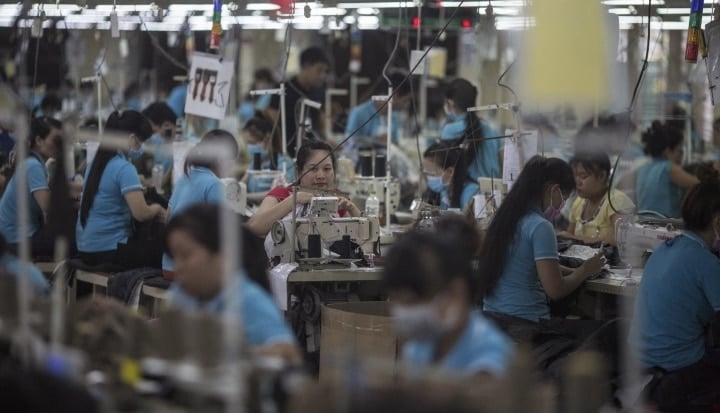Companies’ purchasing practices can have a profound impact on human rights. Businesses are under mounting pressure to take responsibility for the wellbeing of the women and men working in their supply chains, with mandatory human rights due diligence legislation approved or underway in several countries.
While Corporate Social Responsibility and sustainability teams are working hard to adopt more robust human rights due diligence processes, purchasing practices have the potential to undermine efforts to be responsible. Conventional purchasing practices tend to deflect risk to suppliers, squeezing their margins and putting them under pressure to deliver within short timescales.
The graphic below visualizes the problem: purchasing practices—including aggressive price negotiation, inaccurate forecasting, late orders, short lead times and last-minute changes—put suppliers under intense pressure. This often results in increased work intensity and excessive overtime for workers, which, in turn, lead to poor working conditions and low pay for workers, which directly relate to the basic human rights outlined in the Universal Declaration of Human Rights. It can also lead to unauthorized subcontracting to suppliers with poor labor standards. Important initiatives like Better Buying have documented the profound impact of purchasing practices on suppliers.

Source: Better Jobs in Better Supply Chains, Oxfam 2010.
The link between conventional purchasing practices and the impact on working conditions in production countries is well established. Oxfam published this diagram over ten years ago. Many companies have trained their buyers on the impact of purchasing practices on people in the supply chain. However, most companies have scarcely scratched the surface of adopting responsible purchasing practices and unfair practices are still the norm.
Understanding the problem
Over the past few years, Oxfam’s work on supply chains put a spotlight on the food sector, where human rights violations are widespread. Research conducted for the Behind the Barcodes campaign revealed that supermarkets’ reliance on ‘unfair trading practices’ (see diagram) is one of the root causes of the human suffering in the production of the food that we buy. The result of these practices is to depress the prices paid to suppliers and increase the risks that suppliers incur (e.g. of failed harvests or input price rises). The downward pressure that suppliers experience results in wage cuts, poor labour conditions and failure to respect workers’ human rights.

Source: Ripe for Change, Oxfam 2018.
Spotlight on price negotiation
Aggressive price negotiations can have a direct impact on suppliers’ ability to pay workers decent wages and respect their human rights. A human rights impact assessment (HRIA) conducted by Oxfam of Finnish SOK Corporation’s Italian processed tomato supply chains showed how aggressive negotiation resulted in prices that were decoupled from cost of production. In the context of strong power imbalances, suppliers felt they had no choice but to constantly lower their prices despite rising costs. Suppliers were initially invited to quote for given volumes of product (initial tender). Buyers then selected the suppliers with lowest initial quotes and invited them to lower bids against one another in short time-bound windows (reverse e-auction). In 90% of cases, the lowest bid won the contract. As a result, over a period of time of five years, while costs went up, prices paid declined both for producers (by 10%) and for SOK suppliers (by 15-25%).
The HRIA highlights that these purchasing practices were at the root of serious violations of human rights for workers: health and safety risks on farms and in transport to work, unsafe and unsanitary housing, forced labour, low wages and excessive overtime, restrictions to freedom of association and lack to access to remedy. Credit should be given to SOK for wanting to find this out and being publicly transparent with results of this assessment so others can learn too.
Six concrete steps to make positive change
The risk and responsibility for human rights should be shared between buyers and suppliers. Yet predominant purchasing practices continue to transfer risk onto suppliers. It doesn’t need to be like this. There are six concrete steps that companies can take immediately to change this:
- Cultivate robust, long-term supplier relationships: reward suppliers with better human rights performance with more business, longer-term contracts and fewer audits.
- Balanced scorecard: assess suppliers against commercial AND ethical criteria.
- Training: train buyers so they understand the human rights impacts of their purchasing decisions.
- Incentives: give buyers incentives to select suppliers who show respect of human rights and align bonuses with human rights performances of suppliers.
- Forecasting: use better purchasing and forecasting, smoothing out peaks and troughs in orders.
- Benchmarking and assessing progress: measure the impacts of purchasing practices and progress towards goals by gathering data from suppliers through initiatives such as Better Buying.
This article has been adapted from a forthcoming blog post to be published on the Better Buying Institute webpage.
The Oxfam Business Advisory Service supports companies to improve their impact in global supply chains. We enable businesses to access the wealth of experience and expertise within Oxfam to strengthen corporate human rights, labour rights and gender strategies, policies, implementation and impact. For more information contact Monica Romis at mr*****@ox***.uk.
Related reading:
Oxfam HRIA on SOK Italian tomato supply chain: The people behind the prices










